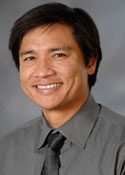CCU professor presents climate research in annual lecture series
Limpasuvan is the 14th recipient of the Distinguished Teacher Scholar Lecturer Award, presented each year by Horry Telephone Cooperative (HTC) to a Coastal Carolina University faculty member who has outstanding abilities as a teacher, scholar and communicator. The recipient of the honor delivers a public lecture on an original topic drawn from his or her area of expertise.
In this year’s lecture, Limpasuvan will present his ongoing research on the dynamics of the earth’s ever-changing atmosphere. He likens our climate system to a functioning heart that becomes arrhythmic due to unusual atmospheric occurrences 30,000 feet above the ground.
“To date, our limited knowledge of the atmosphere at these lofty heights—together with computational constraints—makes it difficult for scientists to make accurate assessments and predictions about future global climate change,” said Limpasuvan. “Rapid developments in technology are allowing us to better observe and simulate the atmosphere.”
Originally from Thailand, Limpasuvan joined the CCU faculty in 2000. He earned bachelor's degrees in physics and mechanical engineering from Occidental College and the California Institute of Technology, respectively. He earned a doctorate in atmospheric sciences from the University of Washington and was appointed to a research associate position at the Joint Institute for the Study for the Atmosphere and Ocean in Seattle. He was CCU's Teacher of the Year in 2000-2001 and South Carolina's Distinguished Professor in 2001. In 2007, he received the South Carolina Governor’s Young Scientist Award for Scientific Excellence.



